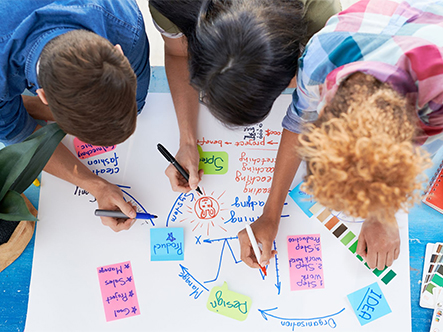
02 November 2020 – Osman Bedel –
Embracing Project-Based Learning: Cultivating Essential Skills for Real-World Success
In the dynamic landscape of education, traditional teaching methods are giving way to more innovative and student-centered approaches. One such approach that has gained momentum in recent years is project-based learning (PBL). By immersing students in real-world problems and challenges, PBL fosters deep engagement, critical thinking, problem-solving, and collaboration skills. In this blog post, we will delve into the concept of project-based learning, its benefits, and how it equips students with essential skills for success in the real world.
Understanding Project-Based Learning
Project-based learning is an inquiry-based approach that centers around students actively exploring and tackling real-world problems. Instead of passively receiving information, students become active participants in their learning journey. Guided by a driving question or problem, they work collaboratively in teams to conduct research, design solutions, and implement their ideas. Throughout the process, students gain knowledge and skills across various disciplines while simultaneously developing important life skills.
Key Elements of Project-Based Learning
-
Real-World Relevance: Project-based learning emphasizes connecting classroom learning to real-world contexts. By addressing authentic problems, students understand the practical applications of their knowledge and skills, fostering a deeper understanding and motivation.
-
Inquiry and Exploration: PBL encourages students to ask questions, conduct research, and explore multiple perspectives to gain a comprehensive understanding of the problem at hand. This process nurtures critical thinking and information literacy skills as students seek solutions and evaluate their effectiveness.
-
Collaboration and Communication: Project-based learning promotes collaboration among students as they work together in teams to brainstorm ideas, delegate tasks, and solve problems. Collaboration enhances communication skills, encourages diverse perspectives, and mirrors the collaborative environments of the professional world.
-
Ownership and Reflection: PBL empowers students to take ownership of their learning. They make decisions, set goals, and monitor their progress throughout the project. Regular reflection allows students to assess their learning, identify areas for improvement, and celebrate achievements, fostering metacognition and self-directed learning skills.
Benefits of Project-Based Learning
-
Engaged Learning: Project-based learning sparks students’ curiosity and ignites their passion for learning. By immersing themselves in real-world problems, students become active participants, leading to increased engagement and intrinsic motivation to explore and seek solutions.
-
Critical Thinking and Problem-Solving: PBL encourages students to analyze complex problems, think critically, and develop innovative solutions. By encountering challenges and obstacles, students learn to adapt, persevere, and think creatively, preparing them to tackle real-world problems beyond the classroom.
-
Collaboration and Communication Skills: Working in teams allows students to develop essential collaboration and communication skills. They learn to listen actively, respect diverse opinions, negotiate ideas, and effectively communicate their thoughts and findings, mirroring the collaborative nature of professional environments.
-
Application of Knowledge: Project-based learning bridges the gap between theoretical knowledge and its practical application. By connecting classroom concepts to real-world situations, students understand the relevance and purpose of their learning, solidifying their understanding and retention of information.
-
Holistic Skill Development: PBL nurtures a range of skills beyond academic knowledge. Students enhance their research skills, time management, organization, problem-solving, critical thinking, and creativity. They also develop presentation skills, adaptability, and resilience, preparing them for success in the 21st-century workforce.
Project-based learning serves as a transformative approach to education, providing students with the opportunity to develop essential skills for success in the real world. By engaging students in real-world problems, PBL nurtures critical thinking, problem-solving, collaboration, and communication skills. As students tackle authentic challenges, they cultivate a sense of ownership, reflection, and a lifelong love for learning






